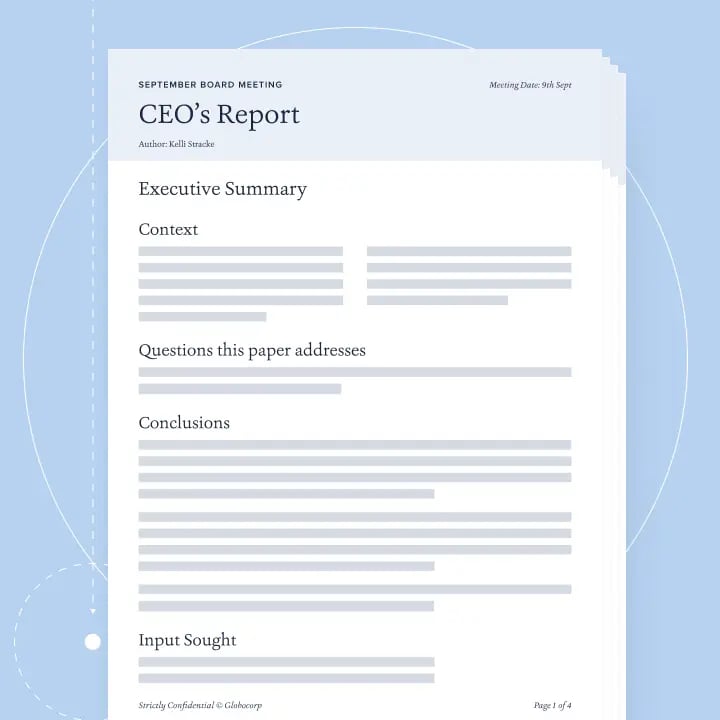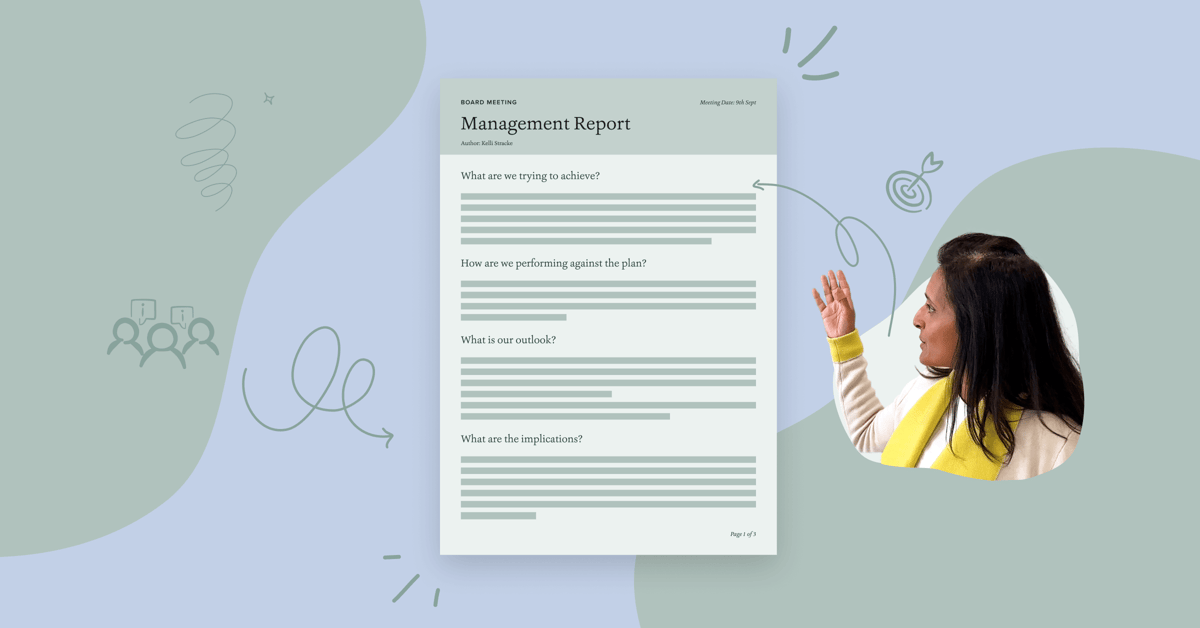What are management reports and why do they matter?
A management report summarizes a business unit, function, or team's performance and prospects. Typically written monthly, it’s a report that a leader will be frequently asked to write. It can go by many different names — business updates, operational updates, performance reviews, or MI reports, for example.
Done well, a management report provides valuable insight into a team's activity and its outcomes, making it a vital tool for decision-making.
It is also the writer's chance to instill confidence and build trust. It demonstrates to colleagues, the executive team, and the board that you understand the drivers of your team's performance and shows that you can be trusted with resources and decisions.
But the trap that many people fall into is writing a “busyness” report, that is, an account of all the things that are keeping them busy. And that's not what your board or your boss is looking for.
Directors want to know whether you grasp the key issues in your part of the business and whether you have the smarts to propose how best to tackle them. Your ability to pull the signal from the noise and plot a course through it is great leadership, and that’s what your readers want.
What are the key features of a great management report?
The best management reports deliver actionable insights in a format that is easy to engage with. They are:
- Well structured, providing a comprehensive overview of the topic.
- Concise and to the point.
- Written in an engaging style that's easy to read and digest.
- Focused on delivering actionable insight, rather than information for information's sake.
- Supported with relevant, thoughtfully presented data.
What should you include in a management report?
The success of a management report has very little to do with how much good news you bring to the table. According to research by Board Intelligence, nearly half (42%) of directors think their management and board reports aren't upfront about the bad news, which may be why 68% of board members rate their board packs as "weak" or "poor".
Most reports trip up on the same things. They don’t mention the high-level objectives they’re trying to achieve or how these objectives relate to the organization's big picture. They’re either too backwards-looking or just a good news story. And, finally, they’re inconclusive. They don’t spell out whether you believe you’ll meet your goals or whether you need to course correct.
To avoid these pitfalls and ace your report, you need to address four simple questions.
1. What are we trying to achieve?
Start by recapping your goals and how they support your organization’s higher-level goals. Your reader will be interested in the big issues, so explaining how what you're writing about relates to these will motivate them to read on.
This sounds obvious, right? But, too often, it’s overlooked. As well as orienting your reader, it’s also your chance to connect with the “Why?” that underpins your hard work. Focus and alignment are powerful performance multipliers.
2. How are we performing against our plan?
Split this into two areas:
- Where are we performing better than planned?
- Where are we performing less well than planned?
Just three to five key points for each area are enough. And don’t shy away from sharing bad news; if you don't address upfront what's not gone well, your reader will go searching for evidence of it elsewhere and will draw their own conclusions. Their confidence in you will grow when you tackle the tough questions, own the message, and talk about what you’re doing to address what went wrong.
And, with each of these points you cover, ask yourself, “So what?” What does it imply, and what are we doing in response? This helps to keep your report focused on delivering insight, rather than information for information's sake.
3. What is our outlook?
Look to the future and talk about the opportunities and challenges. This is where the conversation that your report stimulates will be of most value to you. Engaging your reader by asking for their ideas, advice, and experience on your outlook can be invaluable.
4. What are the implications?
When you consider all of the information you've shared, what is your confidence in the plan? Are there things that we should start, stop, or do differently to get us back on track or sustain our outperformance?
Leaders often lean on the facts and leave out what they really think. But there’s no shortage of information these days; in fact, we’re drowning in it. So, what separates the winners from the losers? Our ability to pull meaning from the noise and to identify the best way forward. You’re the expert, and what you think matters.
If you’ve been balanced and expressed judgment, you’ll inspire confidence, and your audience will respect you.
What else should you consider when writing management reports?
As well as structuring your report around the questions outlined above, you should do the following:
- Include a concise executive summary that puts the key messages upfront. This will allow your readers to draw out the most important insights and focus their attention where they can add the most value.
- Write clearly and compellingly so that your readers can easily understand the information. It's not just about what you say; it's about how you say it, and poor communication can undo your hard work.
- Use a data dashboard to provide an engaging visual summary of the KPIs you are reporting against.
What are the benefits of writing a great management report?
A high-quality management report delivers a range of benefits, not just to those you are writing for, but to you, your team, and your wider organization.
- Providing actionable insight improves the quality of decision-making.
- Thinking critically about performance deepens everyone's understanding of what's going on and why.
- Engaging with forward-looking questions will spark creativity that generates better ideas.
- Consice pre-reads make meeting preparation easier and lead to more productive discussions.
- If you build your audience's confidence in you and your plans, you'll be more likely to get the support and the resources you need.
If you'd like to find out how to support your team to write high-quality management reports every time, speak to our advisory team about our board reporting services or take a look at Lucia, our AI-powered thinking and writing platform for board and management reporting.
And if you found this guide useful, links to other videos in the series can be found below.
Or see more of this series
How to write a great…

FAQs
-
What is the difference between management and board reports?
Management reports focus on organizational performance and outlook, while board reports cover a broader range of information for governance, including papers on strategy, risk, and compliance.
-
How often should management reports be written?
Most organizations produce them monthly or quarterly. The frequency should reflect the pace of change in your business and the board’s needs.
-
What common mistakes should be avoided in management reports?
- Overloading the board with detail.
- Providing data without context.
- Avoiding difficult issues or risks.
- Failing to show a clear link between activity and strategy.
-
How can I make my management report more engaging?
- Start with the key messages and questions for the board.
- Use clear visuals for data.
- Keep the narrative short and focused.
- Write as if you are answering the board’s questions directly.
-
What tools can help with creating effective management reports?
Software such as Board Intelligence’s reporting tools can help structure reports, provide KPI dashboards, and keep information transparent and accessible. Templates and collaborative platforms can also save time and improve consistency.



